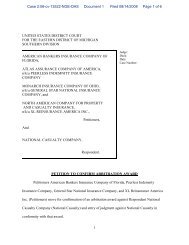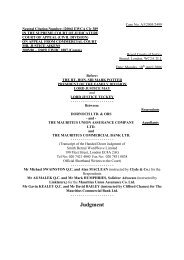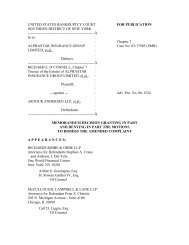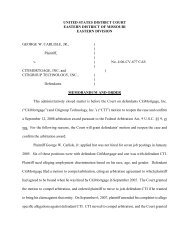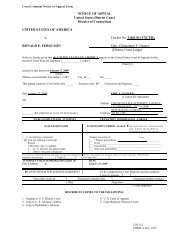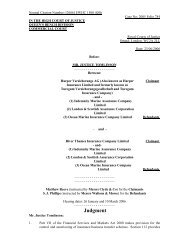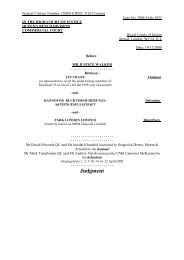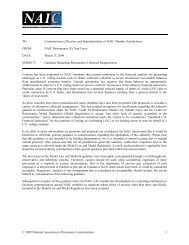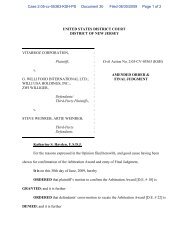Statutory Issue Paper No62R - Reinsurance Focus
Statutory Issue Paper No62R - Reinsurance Focus
Statutory Issue Paper No62R - Reinsurance Focus
Create successful ePaper yourself
Turn your PDF publications into a flip-book with our unique Google optimized e-Paper software.
Property and Casualty <strong>Reinsurance</strong><br />
SSAP No. 62R<br />
12. Determining whether an agreement with a reinsurer provides indemnification against loss or<br />
liability (transfer of risk) relating to insurance risk requires a complete understanding of that contract and<br />
other contracts or agreements between the ceding entity and related reinsurers. A complete understanding<br />
includes an evaluation of all contractual features that (a) limit the amount of insurance risk to which the<br />
reinsurer is subject (e.g., experience refunds, cancellation provisions, adjustable features, or additions of<br />
profitable lines of business to the reinsurance contract) or (b) delay the timely reimbursement of claims by<br />
the reinsurer (e.g., payment schedules or accumulating retentions from multiple years).<br />
13. Indemnification of the ceding entity against loss or liability relating to insurance risk in<br />
reinsurance requires both of the following:<br />
a. The reinsurer assumes significant insurance risk under the reinsured portions of the<br />
underlying insurance agreements; and<br />
b. It is reasonably possible that the reinsurer may realize a significant loss from the<br />
transaction.<br />
14. A reinsurer shall not have assumed significant insurance risk under the reinsured contracts if the<br />
probability of a significant variation in either the amount or timing of payments by the reinsurer is remote.<br />
Implicit in this condition is the requirement that both the amount and timing of the reinsurer’s payments<br />
depend on and directly vary with the amount and timing of claims settled by the ceding entity.<br />
Contractual provisions that delay timely reimbursement to the ceding entity prevent this condition from<br />
being met.<br />
15. The ceding entity’s evaluation of whether it is reasonably possible for a reinsurer to realize a<br />
significant loss from the transaction shall be based on the present value of all cash flows between the<br />
ceding and assuming companies under reasonably possible outcomes, without regard to how the<br />
individual cash flows are described or characterized. An outcome is reasonably possible if its probability<br />
is more than remote. The same interest rate shall be used to compute the present value of cash flows for<br />
each reasonably possible outcome tested. A constant interest rate shall be used in determining those<br />
present values because the possibility of investment income varying from expectations is not an element<br />
of insurance risk. Judgment is required to identify a reasonable and appropriate interest rate.<br />
16. Significance of loss shall be evaluated by comparing the present value of all cash flows,<br />
determined as described in paragraph 15, with the present value of the amounts paid or deemed to have<br />
been paid to the reinsurer. If, based on this comparison, the reinsurer is not exposed to the reasonable<br />
possibility of significant loss, the ceding entity shall be considered indemnified against loss or liability<br />
relating to insurance risk only if substantially all of the insurance risk relating to the reinsured portions of<br />
the underlying insurance agreements has been assumed by the reinsurer. In this narrow circumstance, the<br />
reinsurer’s economic position is virtually equivalent to having written the insurance contract directly. This<br />
condition is met only if insignificant insurance risk is retained by the ceding entity on the retained<br />
portions of the underlying insurance contracts, so that the reinsurer’s exposure to loss is essentially the<br />
same as the reporting entity’s.<br />
17. Payment schedules and accumulating retentions from multiple years are contractual features<br />
inherently designed to delay the timing of reimbursement to the ceding entity. Regardless of what a<br />
particular feature might be called, any feature that can delay timely reimbursement violates the conditions<br />
for reinsurance accounting. Transfer of insurance risk requires that the reinsurer’s payment to the ceding<br />
entity depend on and directly vary with the amount and timing of claims settled under the reinsured<br />
contracts. Contractual features that can delay timely reimbursement prevent this condition from being<br />
met. Therefore, any feature that may affect the timing of the reinsurer’s reimbursement to the ceding<br />
entity shall be closely scrutinized.<br />
© 2009 National Association of Insurance Commissioners 62-6


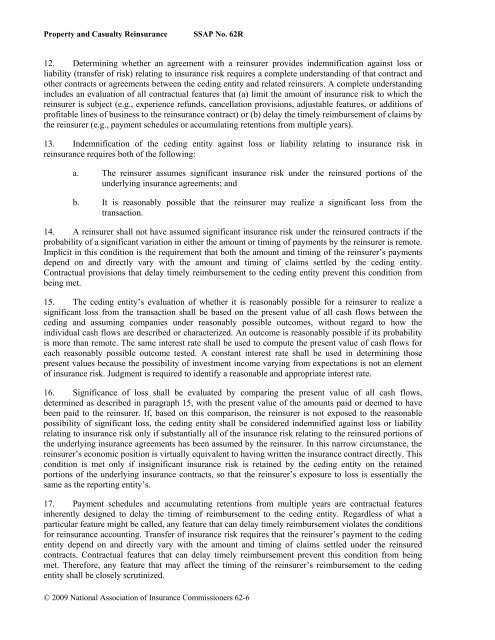
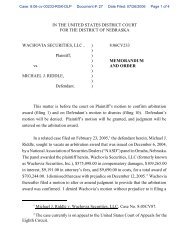
![202 Folio No 734 Neutral Citation Number: [2006] EWHC 1345 (QB ...](https://img.yumpu.com/50015000/1/184x260/202-folio-no-734-neutral-citation-number-2006-ewhc-1345-qb-.jpg?quality=85)
